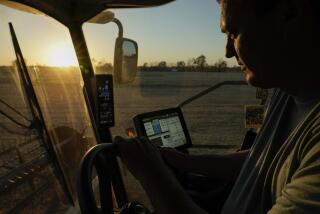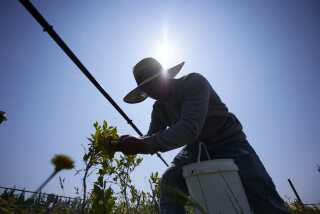Despite Frozen Fields, Farmers Keep Busy
- Share via
CASSELTON, N.D. — The only plows at work shoot rooster tails of snow off the township roads.
Farmsteads on the quarter sections stand out like wooded islands on a vast frozen lake and more than two feet of snow hide the black soil of the Red River Valley.
Fieldwork doesn’t start until mid-April, if the weather cooperates. But forget the jokes about farmers who spend cold months in Phoenix playing pinochle.
Winter might be the time to ease up a little, take some vacation or have an extra cup of coffee at the grain elevator. But for most of the people who grow crops here in Cass County and the rest of Middle America, winter is still a time of hard work--planning the next season’s crops, bargaining over lease agreements, fixing old equipment and figuring out what the newest edicts from Washington will mean for business.
Even the snow is viewed in terms of what kind of flooding it will cause when it melts.
“It’s been a long time since you could lay off in the wintertime and make it,” said Tom Sinner, 65, who with his brother and two sons grows seeds that other farmers will be planting in the spring.
Like others in the flood-stricken Midwest, the Sinners have been cleaning grain like crazy. The wet 1993 season caused a wheat scab that shriveled many kernels. For the wheat to bring any kind of price, it has to weigh close to 60 pounds a bushel. So, gravity machines have been sifting out the lightweight kernels.
Carl Peterson, in nearby Harwood, turned grain cleaning into a winter job. “We were running 24 hours a day till just about Christmas,” said Peterson, 35. “Now, we’re trying to run from 6 a.m. to about midnight.”
At the Greg Schulz farm in Davenport, the hired men were putting together Peterson’s new grain drill, a 50-foot-wide rig that will plant the spring crops.
This time of year, farmers become mechanics. The odor of welding fills huge, heated buildings that house tractors, combines, sprayers, grain drills, trucks.
When it comes to farm equipment, some assembly is always required. And every farmer has a notion of how to improve what the factory did.
Almost everyone has a side job, from selling farm equipment to hauling sunflower husks to Fargo to be burned to heat schools.
“Pay my taxes,” said James Martin, 54, explaining why he stepped outside to auger a truckload of soybeans from his bins.
It’s also time for the mental work of farming, done in banks, county extension offices and in the farm offices usually made from converted bunkhouses or as an afterthought to one of the outbuildings.
“That was my Mexican labor in Texas, calling about W-2s,” said Joe Nelson, 32, hanging up the phone, worrying about his own tax return as well. Property taxes just came due and the federal deadline is March 1.
That’s also the date farmers can start trekking to the local Agriculture Department field office in West Fargo to sign up for farm programs.
Seminars on changes in crop insurance, fuel standards and pesticide safety turn small towns into one-day campuses.
“You could go to a meeting every day of the week if you wanted,” said Nelson, who has a plumbing and insulation business on the side, does Farm Bureau work and sits on the board of the cooperative elevator in Prosper.
His father, Gary, 54, a state senator, complains that “it takes 30% of a man to take care of the government paperwork.” There go December, January, February and March, if that formula applies.
An unseasonably warm day turns many a grower’s fancy to tractors, said Perry Rust, 35, a farmer and equipment dealer in Harwood. “As the melt increases, the quotes increase, and the sales increase,” he said.
Rust’s brother, Dale, 40, sells seed when he’s not farming. “You can actually go home at a decent time,” he said, explaining the chief attraction of winter.
He also plans a second ski trip before it’s back to dawn-to-dusk farm work. “We’ll end up burning a week and a half of winter on fun things,” he said.
More to Read
Sign up for Essential California
The most important California stories and recommendations in your inbox every morning.
You may occasionally receive promotional content from the Los Angeles Times.














